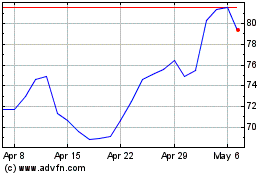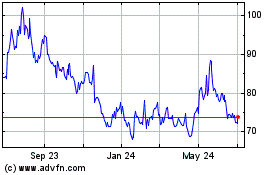Kroger to Sell Groceries on Alibaba Site in China--Update
August 14 2018 - 8:44PM
Dow Jones News
By Liza Lin and Heather Haddon
Kroger Co. will sell its products in China on an e-commerce site
owned by Alibaba Group Holding Ltd., the grocer's first foray into
foreign sales amid a broader push into online retail.
The U.S. supermarket chain on Tuesday said it plans to open an
online storefront on Alibaba's Tmall Global site, the Chinese
internet titan's platform for international brands. Kroger said the
site will launch Wednesday with an initial product offering that
includes dietary supplements and private-label products, much of it
natural and organic goods.
"Growing into the Chinese market is a huge opportunity for
Kroger and we are really excited," said Yael Cosset, Kroger's chief
digital officer, in an interview.
An Alibaba spokeswoman said the company was "pleased to work
with Kroger" on bring its products to the Chinese market,
particularly the grocer's Simple Truth line of natural and organic
goods.
Kroger stock spiked 2.8% after The Wall Street Journal reported
about the partnership.
Kroger executives said they have been negotiating their first
overseas sales push for months.
Mr. Cosset declined to discuss the terms of the financial
arrangement with Alibaba. He said the grocer looked at several
other companies for its first overseas selling deal before deciding
on the Chinese site.
Tougher competition in the U.S. is prompting big retailers to
strike deals abroad. Walmart Inc. in May took a majority stake in
Indian e-commerce giant Flipkart Group.
The new sales push in China is Kroger's fifth e-commerce
initiative in three months. The largest U.S. supermarket chain by
sales and stores is trying to fend off stiffer competition from
Amazon.com Inc., the Whole Foods grocery stores it owns, and other
food sellers.
Kroger increasingly sees its Simple Truth line as a way to
attract new customers domestically and abroad. The goods reached $2
billion in sales earlier this year, Kroger said.
Kroger currently sells those items online in the U.S. through
Vitacost.com Inc., an e-commerce site it acquired in 2014. The
grocer has generated strong sales of its natural and organic
products on the site, including in parts of the U.S. where it
doesn't have grocery stores, Kroger said.
Kroger selected the initial line of products to sell in China
through consumer surveys, and they will be further expanded, Mr.
Cosset said.
Earlier this month, Kroger started delivering directly to homes
and businesses through third-party carriers. In May, Kroger took a
stake in British online grocer Ocado Group PLC to run automated
delivery warehouses for digital orders. It also acquired Home Chef
to sell its meal kits in stores and online, and is working with
electric-vehicle startup Nuro Inc. to test driverless grocery
deliveries.
After focusing for years on sales at their 2,800 U.S. stores,
Kroger executives have also visited India, China, Japan and Europe
recently to study the habits of foreign consumers and search for
technologies to use in the U.S.
"You should continue to see us doing partnerships and
relationships with multiple people across the world," Chief
Executive Rodney McMullen said in an interview earlier this
year.
For Alibaba, owner of China's two most popular e-commerce
websites, Kroger's products could provide a leg up in the nation's
fiercely competitive online grocery market. Walmart owns a 12%
stake in JD.com Inc., Alibaba's biggest rival in China.
Signing a deal with Kroger also adds to the list of U.S.
merchants Alibaba has been seeking to woo over the past years as
consumers there are increasingly shifting their purchases from
brick and mortar stores online.
In 2015, Hangzhou-based Alibaba signed an exclusive deal to help
Cincinnati-based department store Macy's Inc. operate its online
sales website in China.
Since then, the Chinese company has attracted retailers such as
Costco Wholesale Corp., Gap Inc. and most recently Starbucks Corp.,
to sell their products on its e-commerce platforms. Alibaba
Chairman Jack Ma traveled to Detroit last year to urge small
businesses to use its platforms to reach Chinese consumers hungry
for U.S. brands.
Write to Liza Lin at Liza.Lin@wsj.com and Heather Haddon at
heather.haddon@wsj.com
(END) Dow Jones Newswires
August 14, 2018 20:29 ET (00:29 GMT)
Copyright (c) 2018 Dow Jones & Company, Inc.
Alibaba (NYSE:BABA)
Historical Stock Chart
From Mar 2024 to Apr 2024

Alibaba (NYSE:BABA)
Historical Stock Chart
From Apr 2023 to Apr 2024
